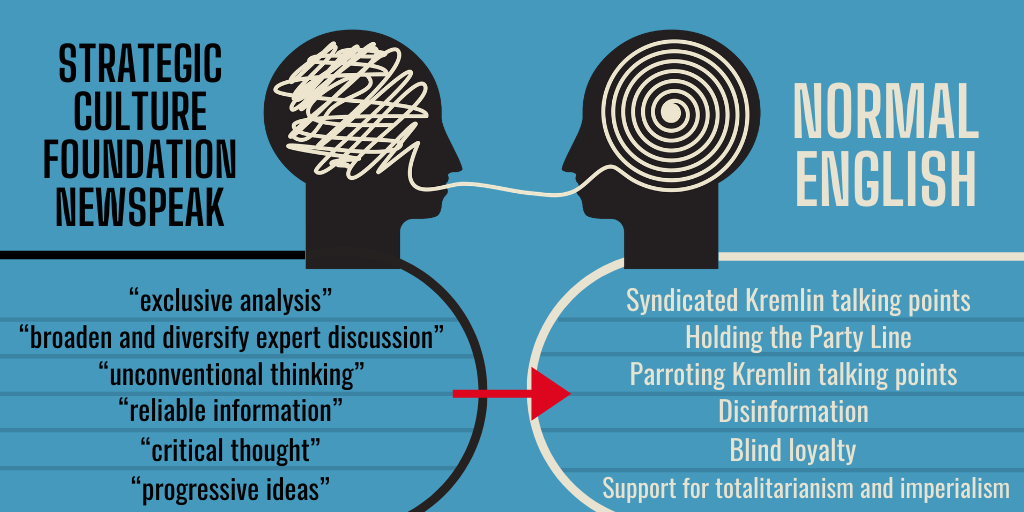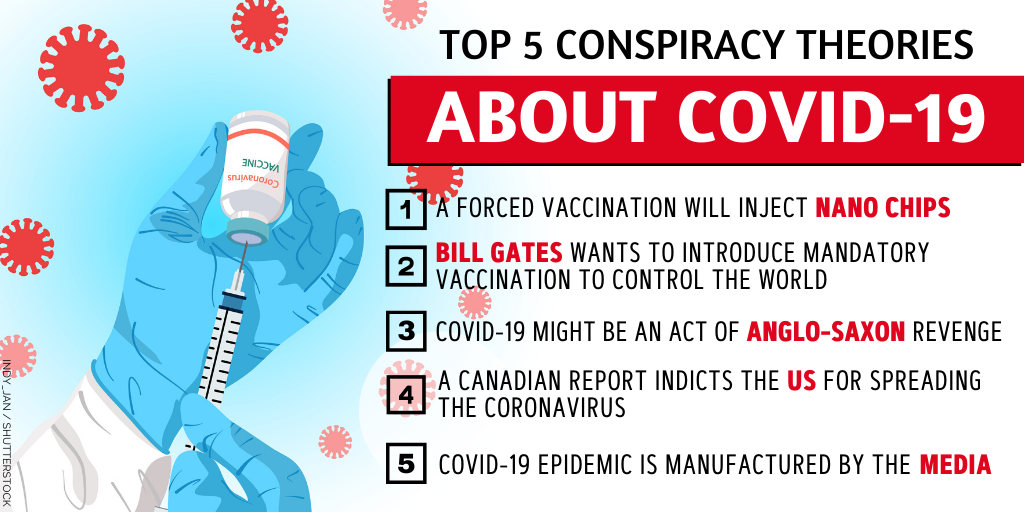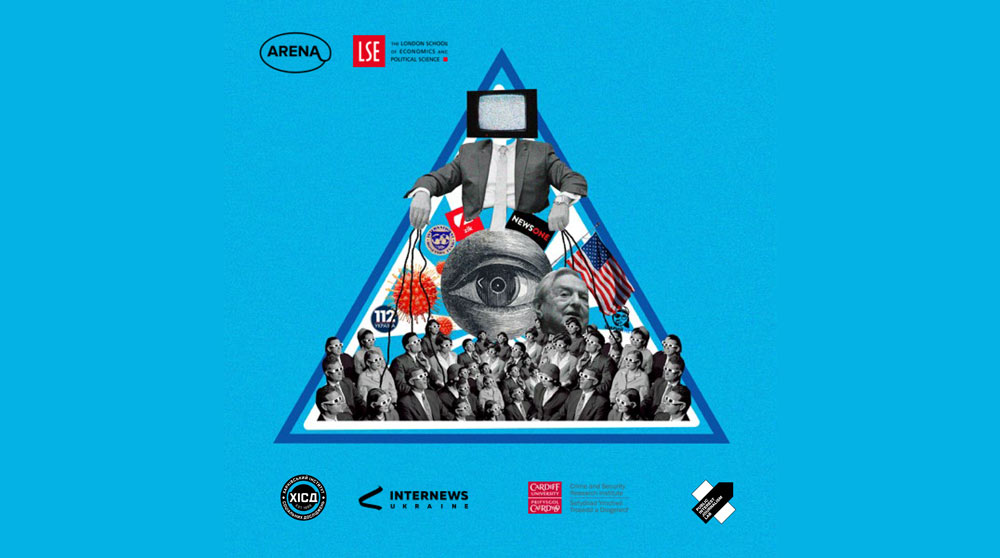The author of the article hints that ominous techniques for mind control are at play, forcing everyone (except for the author and those, who read her article, who are, thank God, immune to these techniques) to blindly accept lies and deception about Russia.
This is a very Orwellian use of Orwell’s novel.
A key concept in Nineteen Eighty-Four is “Newspeak.” A language designed by the novel’s IngSoc [English Socialist] Party to eliminate the people’s ability to express dissent. Orwell describes the principles of newspeak in an essay:
No word in the B vocabulary was ideologically neutral. A great many were euphemisms. Such words, for instance, as joy camp (forced-labor camp) or Minipax (Ministry of Peace, i.e. Ministry of War) meant almost the exact opposite of what they appeared to mean.
Kremlin Newspeak
Strategic Culture Foundation’s Mission Statement can be seen as a good example of Newspeak:
The Strategic Culture Foundation provides a platform for exclusive analysis, research and policy comment on Eurasian and global affairs. We cover political, economic, social and security issues worldwide. Since 2005, our journal has published thousands of analytical briefs and commentaries with the unique perspective of independent contributors. SCF works to broaden and diversify expert discussion by focusing on hidden aspects of international politics and unconventional thinking. Benefitting from the expanding power of the Internet, we work to spread reliable information, critical, and progressive ideas.
Let us break this down along Orwell’s description of newspeak: “Words meant almost exactly the opposite of what they appear to mean”:

Strategic Culture Foundation is a Russia based website, described by the Russian Ministry of Foreign Affairs as a “partner”. The site is submissively loyal to the Kremlin party line, parroting the talking points from Moscow on the Skripal Case
, MH17, and the Russian president personally, and even supporting Russian imperialism in Syria and Ukraine.
George Orwell describes three slogans, used in the novel’s state,
War is Peace. Freedom is Slavery. Ignorance is Strength.
The messages of Culture Foundation boils down to a few key points: Challenging Kremlin claims is wrongthink; praising Russian (and Chinese) imperialistic ambitions is goodthink;
Democracy doesn’t work. We can synthesize a few new slogans of pro-Kremlin Newspeak,
Disinformation is Truth. Imperialism is Liberty. Dictatorship is Progressive.
In short, Strategic Culture Foundation is going Orwellian on Orwell. In the universe of the Strategic Culture Foundation, Nineteen Eighty-Four describes the British Empire:
I think it is safe to say that Orwell intended Big Brother to symbolize the British Empire, the largest empire that has ever existed in world history.
“Disregard to historical truth”
It is rather hard to understand how anyone, who actually read the novel, could associate its totalitarian state with the British Empire. Orwell was influenced by the Russian author Yevgeny Zamyatin’s We and his own impressions of the Stalin purges in the thirties and the Soviet betrayal of Republican Spain during the Civil War. Another influence was the Tehran Conference in 1943, where the allied leaders “divided the world” between them. The Western powers’ policy of appeasement towards Stalin allowed the Soviet Union to establish a “sphere of interest” in Europe. Orwell was a critic of British, and Russian imperialism. Unlike the Strategic Culture Foundation, he was against all manifestations of imperialism.
One might suggest the authors of the 200 plus articles, referring to “Orwell”, read some actual texts by George Orwell. Like his foreword to a war-time edition of Animal Farm,
The servility with which the greater part of the English intelligentsia have swallowed and repeated Russian propaganda from 1941 onwards, would be quite astounding if it were not that they have behaved similarly on several earlier occasions. On one controversial issue after, the Russian viewpoint has been accepted without examination and then publicized with complete disregard for historical truth or intellectual decency.
In the Kremlin ecosystem, the word “Orwellian” has nothing to do with George Orwell’s novel, legal in Russia only since 1988. In the Kremlin world, criticizing Russian policies is Orwellian. Or, with the words of the spokesperson of the Russian Ministry of Foreign Affairs, Maria Zakharova,
This is pure disinformation, just as in Orwell’s 1982! (Sic!)
In Orwell’s novel, the protagonist Winston Smith also does not know what year it is.

Read more:
- A guide to Russian propaganda
- Putinism isn't the Brezhnevism of today: it's far more dangerous
- Five more disturbing revenants from Soviet past in Putin’s Russia
- Putin’s Victory Parade – a horrific Orwellian exercise, Khots says
- ‘Enemy of the people’ is a Russian — not an American — term
- Putin's Syrian campaign a truly 'Orwellian one,' Kalashnikov says
- Orwell Art: lessons on democracy, civic engagement and global citizenship
- 15-point checklist of Putin regime's propaganda techniques





